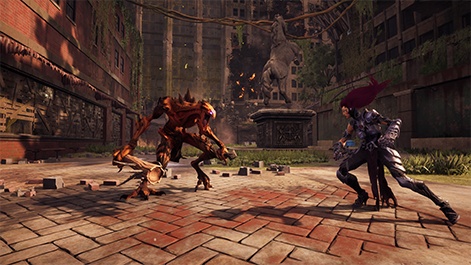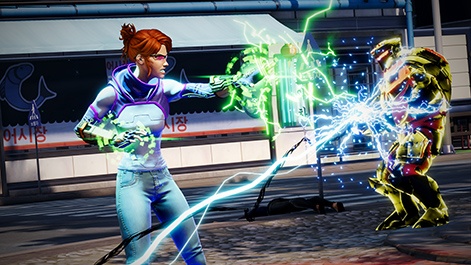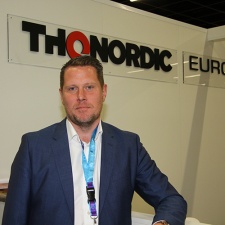The first time I sat down with THQ Nordic CEO Lars Wingefors, it was in the rather small and barebones Nordic Games Group booth at Gamescom 2014.
The year prior, the company had purchased a slew of IP from the THQ fire sale, such as Darksiders. Wingefors even splashed $5m of his own cash buying that firm's name and went on to rebrand the games company as THQ Nordic in 2016.
At the time, he told me that this last deal was the best he had ever made.
Back in 2014, the THQ brand was absolutely sullied. It was the name of a company that flew too close to the sun and went down in spectacular fashion. It had little value - aside from that five mil Wingefors had just dolled out.
And though his company had a suite of decent IP in its stable, they all looked like they would require more money to develop further than Nordic was prepared to spend. To pick one example - Darksiders 2 had cost THQ in the region of $50m to develop. Wingefors said it didn't require nearly as much.
All of which is to say that while I was certainly interested to see how it all panned out, I wasn't really on board with the vision that Wingefors had laid out.
So, sitting down with the man himself in the 'boardroom' of THQ Nordic's much fancier area at Gamescom 2018 in the same year that the company splashed out $196m buying Deep Silver parent company Koch Media, it's fair to say that Wingefors has had the last laugh - but it's been slow progress.
"The business took off in 2013 but really we've been building step-by-step, learning how to grow publishing and development using my team and I's experience," he explains.
"What we have been good at is catching opportunities. I like to do things differently. Other people have been leaving part of the markets we have been engaging with. I like to have a very diversified portfolio of IPs for example. We have made a number of IP - more than 100 currently. We have a clear model how to work with it. We made than 30 acquisitions since 2011."

The biggest deal that THQ Nordic has made in recent memory is naturally Deep Silver parent firm Koch Media which came about after the two companies worked together for a project called Elex.
"I have a lot of respect for Koch over the years and I've known Klemens [Kundratitz, CEO] a bit - he's a very good businessman," he explains.
"That company also acquired a lot of THQ brands [including Metro, Dead Island and Saints Row]. We had a lot in common. They're also privately owned by a major founder, Franz Koch who wasn't engaging in the business. We engaged Koch Media as a distributor for Elex and during the signing dinner we talked about doing more in the future.
"Then Agents of Mayhem came out. That was a bit painful. It was a great game in a way. At the end of the day, Klemens told me we needed to step further and then I went a few days after to meet with him and Franz in their home town Innsbruck, Austria together with my colleague Erik (Stenberg, CFO). We sat down for a few hours and then agreed.
"The group found a great home. We understand them, we understand the industry and we have the resources to support the future. We've really been building their business plan further. I understand physical distribution well because that's my background. Perhaps other wouldn't have appreciated that in the same way. I truly see the benefit of having this distribution power as a publisher. Now we have moved the THQ Nordic distribution to Koch Media across Europe."
I've clearly told my teams that we need to take our time to make really polished products. We need to have the patience to find the right release windows.
This move makes sense for both parties involved. While Koch Media owns a lot of great IP, with releases like Homefront: The Revolution and Agents of Mayhem, there was the impression that the firm let some of its games come out too early and as a result they were lacking the polish required to make them truly great. Our guess would be that the company couldn't risk - or simply didn't want to - spending more money to let projects have more time in development, so they ended up rushed out.
THQ Nordic, however, has the money needed. And Wingefors wants his company to take its time.
"I've clearly told my teams that we need to take our time to make really polished products," he says.
"We need to have the patience to find the right release windows. Biomutant is an example - it's been delayed until next year just to polish the game further. This is a new IP as well, which is really important to get right."
Biomutant actually stands out a little in THQ Nordic's catalogue. The firm has historically operated on the model of acquiring IP and then developing it further. Sure, the firm has since bought the Biomutant IP - and its developer Experiment 101 - but new IP is definitely new territory for the company.
Moving forward, Wingefors wants to have a greater mix of existing IP - safe bets - and new franchises, which are historically a more risky proposition.
"I'm sure you'll find new IP in our line-up in the upcoming years, either as a publishing product or an in-house project," he says.
"The focus is really the business of acquiring IPs and building around that. That is a well-established model that works well for us. I can see the attraction for developer teams to join us so that we have this range of IP and development in-house. Most people have played our games in the past and have liked them."

It's no secret that the THQ Nordic is looking to make more acquisitions. The firm has $316m in liquid cash now - but what is the company after?
"We're looking for three things," Wingefors says.
"First and foremost we're after IP. We will continue doing that - either single franchises or catalogues of IP and assets. We have hopefully proven to consumers that we are able to actually make something out of IPs, not just taking the cash but actually remastering or porting then doing the sequels. It takes five years to bring the sequel out, but that's the reality of this industry.
"Secondly, we are actively looking for further development studios that want to join our family - either with or without their own IP and business. It could be a studio with their IP or we can give them an IP to look after - or people we are already working with, sharing the same culture. And finally, we are looking for publishers - adding genres or a niche or a market that we're not that strong in. There are various territories or markets that we don't have the same power as we have in central Europe. When we make acquisitions, I prefer leaving trusted people. If they have a great plan in already, then leaving them to execute on that. We're finding soft synergies - it can be a development team that needs help with the publishing and physical distribution side of things, or we take them to trade shows around the world. It's a smorgasbord of options. And now having Koch on board, that smorgasbord has grown even greater."
Though THQ Nordic has been growing consistently for the last five years, this year feels very much like the realisation of the vision that Wingefors laid out to me in 2014 - a European publishing powerhouse that is snapping up IPs, studios and making games on a reasonable budget. It has its biggest Gamescom presence yet and new iterations in franchises it bought back in 2013 are finally coming to fruition.
"I like to build from the ground up. We're taking this step-by-step. We're building our own creature," he explains.
"I clearly see the benefit of having a very diversified group of companies. I like to have a diversified portfolio of development and IPs. Looking to the future, I really see the value of it. There's new tech coming out that will change the industry. Being a content creator is a good position. One example is the subscription service. Streaming technology is another. We don't have the strategy of running our own end-consumer platform as others have. We will work with partners running their platforms. Obviously, all business models aren't clear.
"Hopefully at the end of the day we could reach even more consumers who will enjoy our products. That's great for business."

















